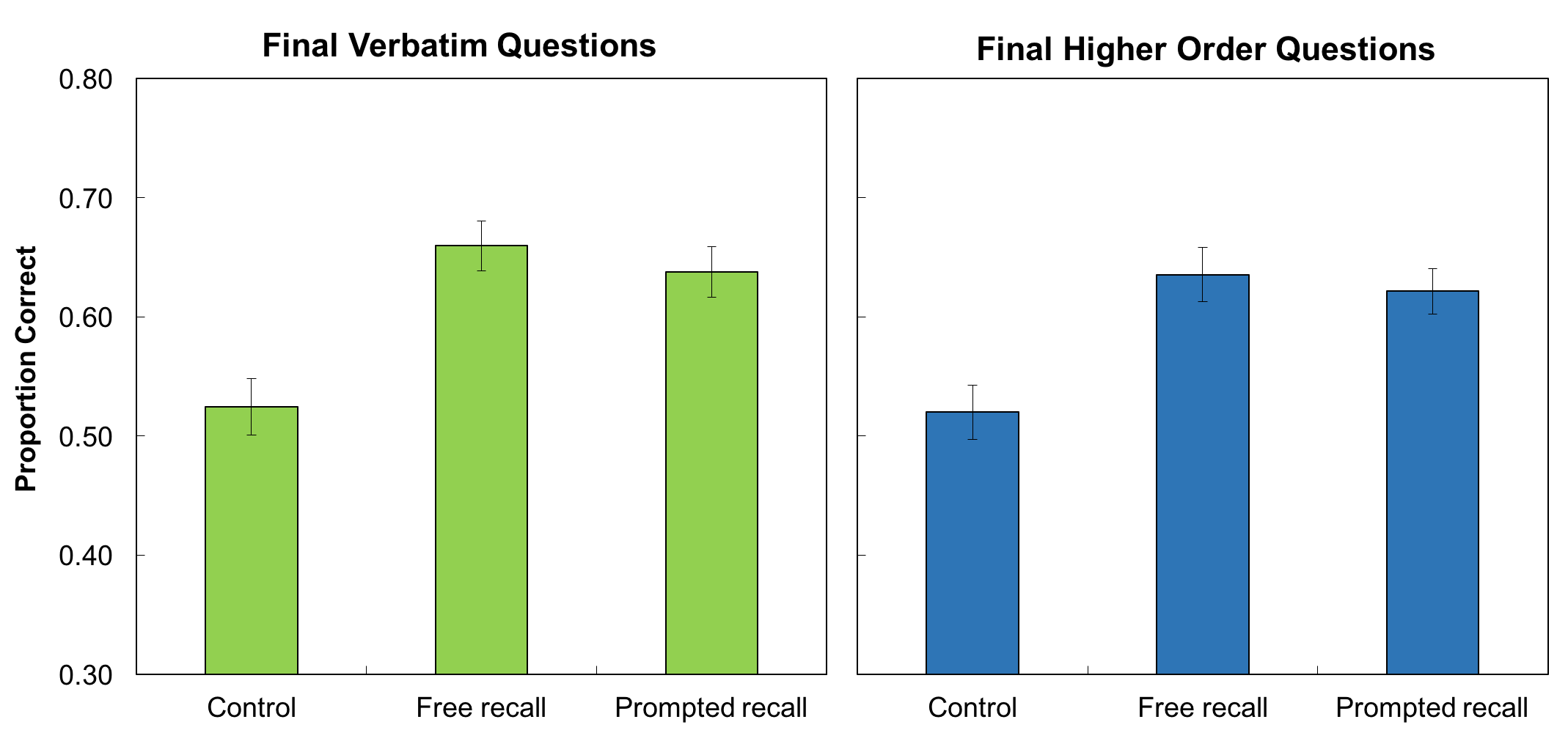Does Prompting Students During Retrieval Practice Improve Performance?
By Megan Smith
When we practice retrieval, or bring information to mind from our memories, we typically improve our memory for the information. Retrieval practice can be implemented in a lot of different ways, and we’ve talked about a number of them, for example short-answer or multiple-choice quizzes, writing out everything you know, using flashcards, creating concept maps from memory (see this post and this post), or drawing what you know from memory. Possibly one of the easiest ways to implement retrieval practice in the classroom is to ask students to put away their course materials and write out everything they can remember. (In the cognitive literature, this is called “free recall” because the students are recalling everything they can remember in any order they want, without explicit prompts.)
However, free recall without any prompts is very difficult. In my previous research, my colleagues and I have found that elementary students really struggle with the blank sheet of paper. But even for college students, free recall can be difficult, and students are not always able to remember to recall everything. Of course, perfect recall isn’t necessary for students to benefit from retrieval. However, my colleagues and I wanted to see if we could provide scaffolded prompts to help students better recall during retrieval practice (1). Our idea was that if we gave them prompts that helped them recall more during practice, they might perform better on the learning assessment one week later.
The Experiments
We conducted two experiments. The first experiment was with college students in the lab at Purdue University, and the second experiment was conducted online with people using Amazon Mechanical Turk. Importantly, the results were basically the same!
Description of Experiment 1
Retrieval Practice Groups:
In the first experiment, we implemented a repeated retrieval procedure. The students in the retrieval practice groups read a short portion of a textbook, and then practiced retrieval. Then, they reread the text so that they could get feedback on what they remembered and what they didn’t. Finally, they practiced retrieval a second time.
We implemented two types of retrieval practice:
- Free recall – students were asked to type out as much as they could remember without any prompts
- Prompted recall – students were given 6 brief prompts to cue them to remember as much as they could. They were instructed to write as much as they could remember using the prompts.
We also created 4 retrieval practices groups by creating all of the combinations of free recall and prompted recall across the two retrieval practice opportunities. I was particularly interested in the condition where students first practiced promped recall and then free recall. I thought that by giving the students the prompts and then having them recall on their own, I was providing really helpful scaffolds.
Repeated Reading Control:
In the control group participants read the text, but played a video game instead of practicing retrieval.
A week later, the students answered a number of short-answer questions. Some of these questions asked about facts from the text (called verbatim questions), while others required the participants to integrate what they learned or apply what they learned in new situations (called higher order questions).
Results
Retrieval practice improved performance on the basic questions and higher order learning questions, but it didn’t actually matter what type of retrieval they practiced! It seems as though our prompts helped the students to remember some of the information, but at the cost of other information. Basically, it was a wash. The prompts didn’t hurt, but they didn’t help either.
Results from Smith et al., 2016, Experiment 1 with college students (1)
The results were the same in the second experiment with people from Amazon Mechanical Turk, too. There was only one retrieval practice opportunity in this experiment, and both types of retrieval led to better performance than the control.
Results from Smith et al., 2016, Experiment 2 with people on Amazon Mechanical Turk (1)
Overall Conclusion
I am very interested in figuring out ways to help students successfully retrieve information, and I thought for sure these prompts would be helpful! Unfortunately, it seems like all additional support, like my prompts, are not necessarily helpful. In summary, encourage students to practice retrieval, and remind them that this is hard to do and they do not need to be perfect. They should, however, practice repeated retrieval and work themselves up to recalling more and more as they go!
References:
(1) Smith, M. A., Blunt, J. R., Whiffen, J. W., & Karpicke, J. D. (2016). Does providing prompts during retrieval practice improve learning? Applied Cognitive Psychology, 30, 544-553.




